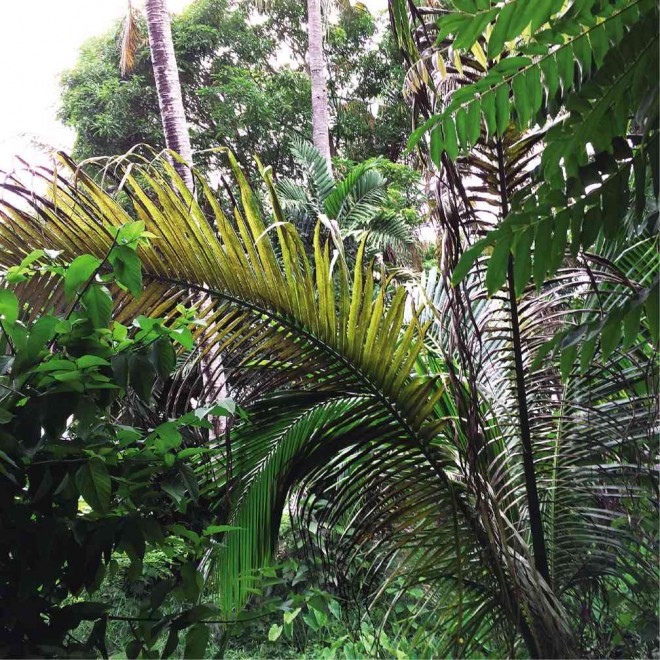
THE COCONUT pest was first detected by the Regional Crop Protection Center of the Department of Agriculture in Barangay (village) Ulango in Tanauan City, Batangas province, in 2009, but the government did not give it serious attention, according to a scientist. LETI BONIOL
ZAMBOANGA CITY, Philippines—Eliminating coconut scale insects (CSI), or “cocolisap,” will not be achieved by pruning affected coconuts or spraying dangerous chemicals, which are also expensive and can spell only money for a few.
Just use fire trucks and load the tanks with a mixture of water, detergent and banana oil, two agriculture experts said.
Farmer Rey Quisumbing, a coconut farmer for years now in Zamboanga del Sur province, and city agriculturist Diosdado Palacat said they were not joking when they recommended the water-detergent-oil mixture to combat the prevalence of CSI in many Luzon areas and in Basilan.
“All you need is a fire truck with boom, firemen and a load of detergent and water oil, then spray the coconut trees. The cocolisap will fall from the leaves,” Palacat told the Inquirer.
When the pest goes away, farmers in the affected areas should start practicing intercropping, Palacat said.
He said that for example, the city had a total of 35,000 hectares planted with coconut. “We also have cocolisap but it does not pose a big problem to our coconut farmers [because] in between [coconut] trees, fruit trees are planted. So before bugs and insects devour the coconuts, they go first to other immediate hosts, like avocados, mangoes, bananas and other fruit trees,” Palacat said.
He said the practice of city farmers was in stark contrast to the monocropping by coconut farmers in Basilan or Batangas provinces.
“In Basilan and Batangas, it’s monocropping, so coconuts there are vulnerable to insect attacks,” Palacat added.
Quisumbing, who planted mainly the sweet water variety, said detergents could poison insects while oil discourages them from attaching themselves to coconut leaves.
This was why, Quisumbing said, he was questioning an advice by the Philippine Coconut Authority (PCA) to use “neonicotinoid,” a class of neuroactive insecticides chemically similar to nicotine, because it could kill trees.
The chemical would be injected to the trunk of coconut trees, which Quisumbing said would “poison the phloem and xylem.”
“Ultimately, our coco water will no longer be fit for drinking,” he said.
Quisumbing said that instead of addressing the cocolisap problem, the use of neonicotinoid would just create a bigger problem, which could even kill the entire coconut industry.
It’s not even environment-friendly, he said, adding that friendly insects, such as bees, butterflies and ladybugs, would not be spared.
Quisumbing said that aside from the water-detergent-oil mixture, the use of the so-called predator parasitoid should also be maximized to contain the cocolisap problem. He said Hawaii and Indonesia, both of which experienced a similar problem in the past, also used biological control against CSI.
Quisumbing said he could only surmise that by pushing for the use of chemicals, some PCA people would gain.
“Maybe because they are after the bigger budget, say P700 million, or the LGUs’ (local government units) calamity fund, which is also about money,” he said.
In the Philippines, he said a kind of neonicotinoid-based chemical was being marketed by LEADS Agricultural Products Corp., whose chair and president is Fernando “Erdie” Maldeva.
He said Maldeva and a PCA consultant, Dr. Rey Velasco, were fraternity brothers at Upsilon Sigma Phi.
“They are frat brothers and now, you see the connection,” Quisumbing said. “That is why we smell something very fishy with this scale insect issue,” Quisumbing added. Julie Alipala, Inquirer Mindanao